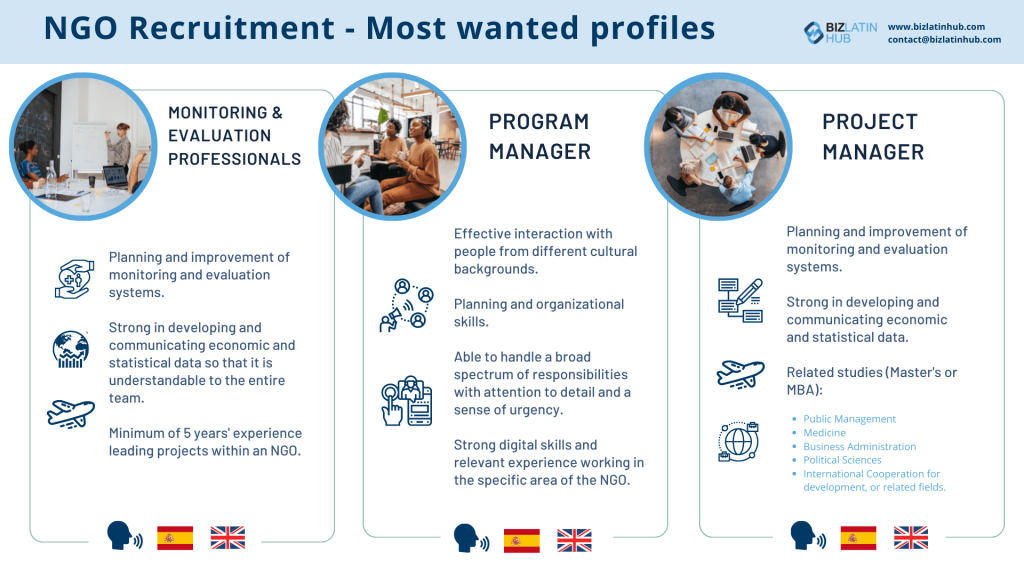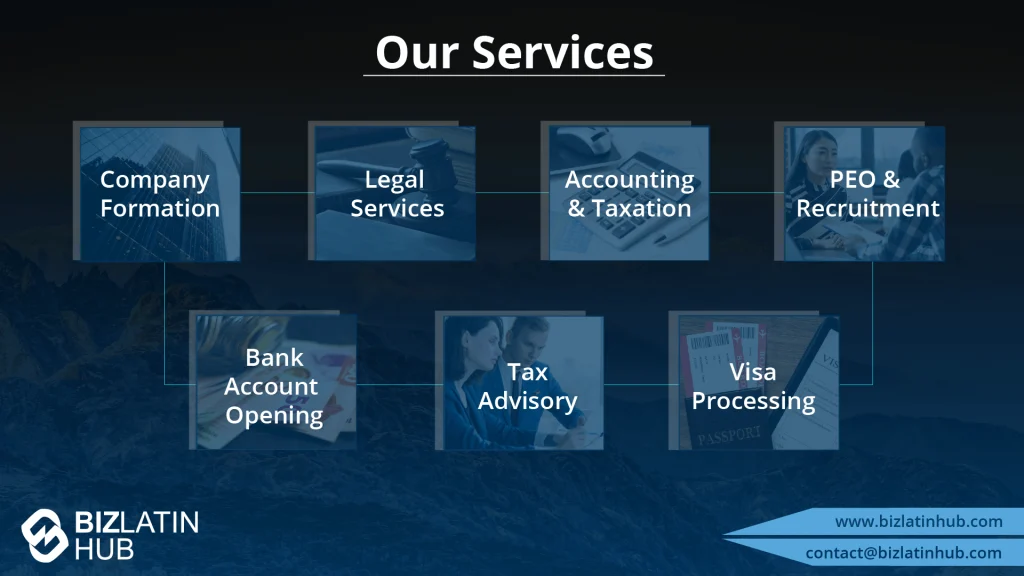Hiring new employees can be complicated and burdensome for even the largest business, and the same is true for Non-Governmental Organization (NGO) recruitment – especially while navigating the diverse legal and cultural landscape of Latin America.
What should organizations keep in mind when it comes to NGO recruitment?
- Understand what skillset your NGO is looking for
- Ensure salary/benefits are commensurate with the role
- Align hiring practices with NGO’s goals
- Comply with local employment laws
- Make diversity a priority
- Figure out the best way to hire foreigners
- Determine whether applicants share the NGO’s values
- Consider upskilling staff to fill new roles
SEE ALSO: How to get the most from a Headhunter in Panama?
Is NGO recruitment as challenging as for-profit company hiring?
Well, yes and no. While the hiring process might be similar between the two entities, the NGO recruitment process will face its own set of unique challenges. Before non-profits post an advert for an open position, they should consider the following:
1. Understand what skillset your NGO is looking for
When non-profit organizations or NGOs need to hire new people, applicants with certain skillsets are obviously important. But skills alone should not be the determining factor in NGO recruitment. Consider applicants who have worked for NGOs or non-profits in the past, or have volunteered or interned with one, even if those applicants don’t possess all the skills you’re looking for. Give greater weight to applicants who have had experience working in the sector.
2. Ensure salary/benefits are commensurate with the role
Unlike the private sector, people who choose to work for a non-profit are often driven by a passion to do good in the world. In NGO recruitment, financial compensation isn’t the main factor behind what they do. But that doesn’t mean they should be regarded as cheap labor. Offering a competitive salary and benefits package will ensure new hires feel a sense of security and be more motivated to take on all the tasks they are responsible for.

3. Align hiring practices with NGO recruitment goals
There may be some difficulty sifting through those applicants whose values a closely aligned with their own, from those people who are simply looking for a job, and plan to use the position you’re offering as a stepping-stone. The best-qualified candidate could have no plan to stay with your NGO long-term. The least qualified candidate could have a passion for the organization and see the position as a career. In some (but not all) cases, passion trumps experience.
4. Comply with local employment laws
When hiring people who live in Latin America, be they local or foreigner, it’s important to get a sense of what the law states in terms of employment; those laws will differ from country to country. In NGO recruitment, all documentation, contract requirements, tax laws, holidays and leave time will have to be factored into the decision to hire.
5. Make diversity an NGO recruitment priority
Bringing together people of different ethnicities, genders, sexual orientations, ages, and cultural backgrounds boosts workplace creativity. Research also indicates that a diverse workplace is good for a business’ bottom line. This is just as true in the non-profit space, so any NGO recruitment decision must be cognizant of the fact that a more inclusive workplace is in everyone’s best interest.
6. Figure out the best way to hire foreigners
Context matters here. In some cases, it will be the responsibility of the person in charge of NGO recruitment to brush up on all the relevant processes and documents of a certain Latin American country before a foreigner can be taken on. In other cases, staff of any sort can be hired on as a contractor, which is a convenient way of getting around the hassle of dealing with visas, work permits, etc. This approach comes with some risk, however. In some Latin American countries, contractors are viewed with suspicion by the local government, who sometimes view this arrangement as a kind of disguised employment.
7. Determine whether applicants share the NGO’s values
In for-profit companies, it’s clear that discussion of contentious political topics is to be avoided. While it’s illegal in most countries to discriminate based on political or religious belief, NGO recruitment finds itself in the unique position of needing to vet candidates to determine if their values are in line with those of the organization. It’s hard to see how a candidate whose personal views/beliefs are radically different than those of the NGO will be a good fit in the organization.
8. Consider upskilling staff to fill new roles
If the NGO recruitment process isn’t producing the right candidate with the ideal combination of skills and passion for the work, then perhaps it’s not meant to be. If a non-profit finds itself in this situation, it might do well to shift gears and offer the position to someone who’s already a respected/trusted member of the team. Maybe the perfect candidate is right under your nose, and all they need is a bit of training or ‘upskilling’ to transition into the new role.
What are some core values of a typical NGO operating in Latin America?
- Service beyond self: The function of an NGO is to serve others, especially those who have been oppressed or historically marginalized.
- Respect for human rights: Most human rights organizations adhere to the Universal Declaration of Human Rights (UDHR) charter and promote the respect for human rights, even in the most violent or unstable areas.
- Core vision: In no unclear terms, the NGO recruitment process should envision an ideal society, and its members, both seasoned and new, should strive towards achieving that ideal.
- Responsibility: It is incumbent upon NGOs to stand by its work and take ownership of its activities and their consequences, be they positive or negative.
- Cooperation across borders: In its mission of addressing poverty and other social ills, the organization should work together with other NGOs in the region to bring about positive change.
- Truthfulness: An NGO should be truthful in its dealings with its donors, project beneficiaries, staff, members, partner organizations, governments, and the public.
Biz Latin Hub Can Help You with NGO Recruitment in Latin America
At Biz Latin Hub, we provide integrated market entry and back-office services throughout Latin America and the Caribbean, with offices in Bogota and Cartagena, as well as over a dozen other major cities in the region. We also have trusted partners in many other markets.
Our unrivalled reach means we are ideally placed to support multi-jurisdiction market entries and cross border operations.
As well as keeping track of NGO recruitment trends, our portfolio of services includes hiring & PEO accounting & taxation, company formation, bank account opening, and corporate legal services.
Contact us today to find out more about how we can assist you finding top talent or otherwise doing business in Latin America and the Caribbean.
If this article on NGO recruitment was of interest to you, check out the rest of our coverage of the region. Or read about our team and expert authors.






